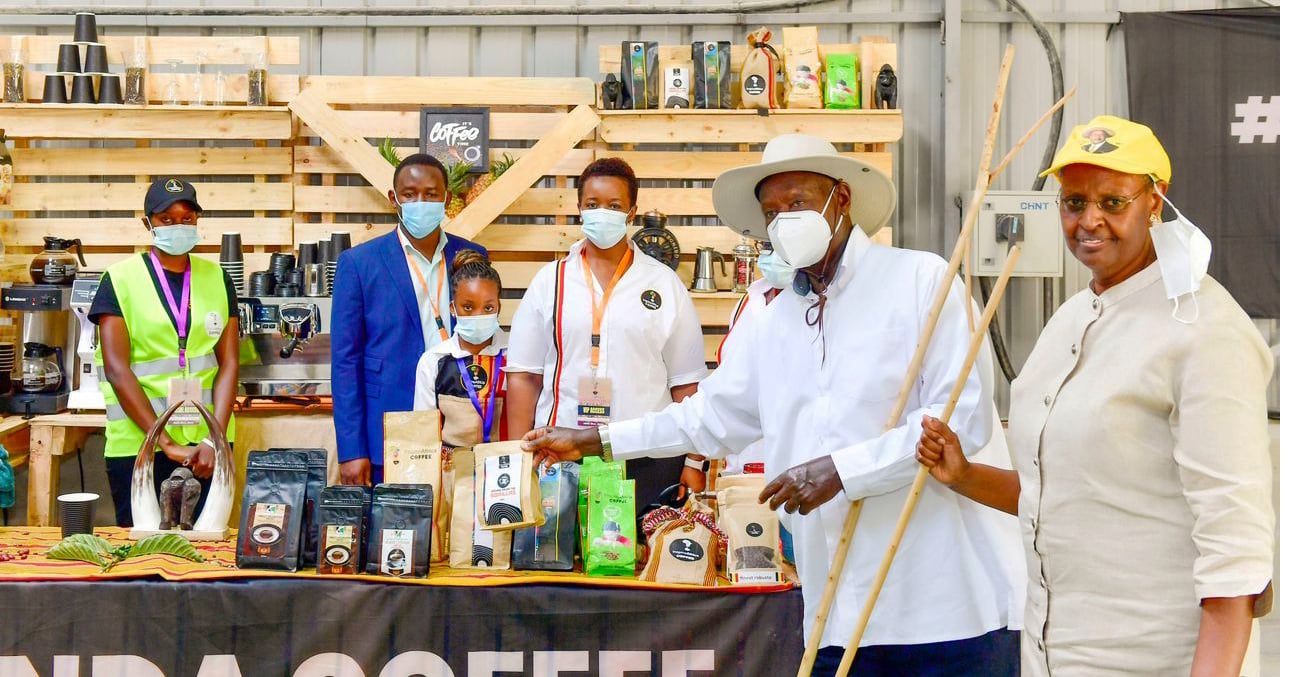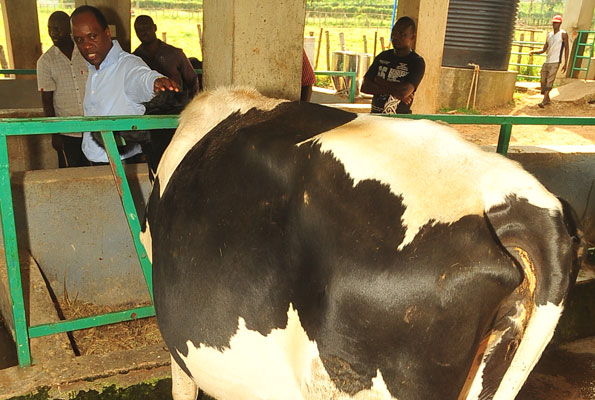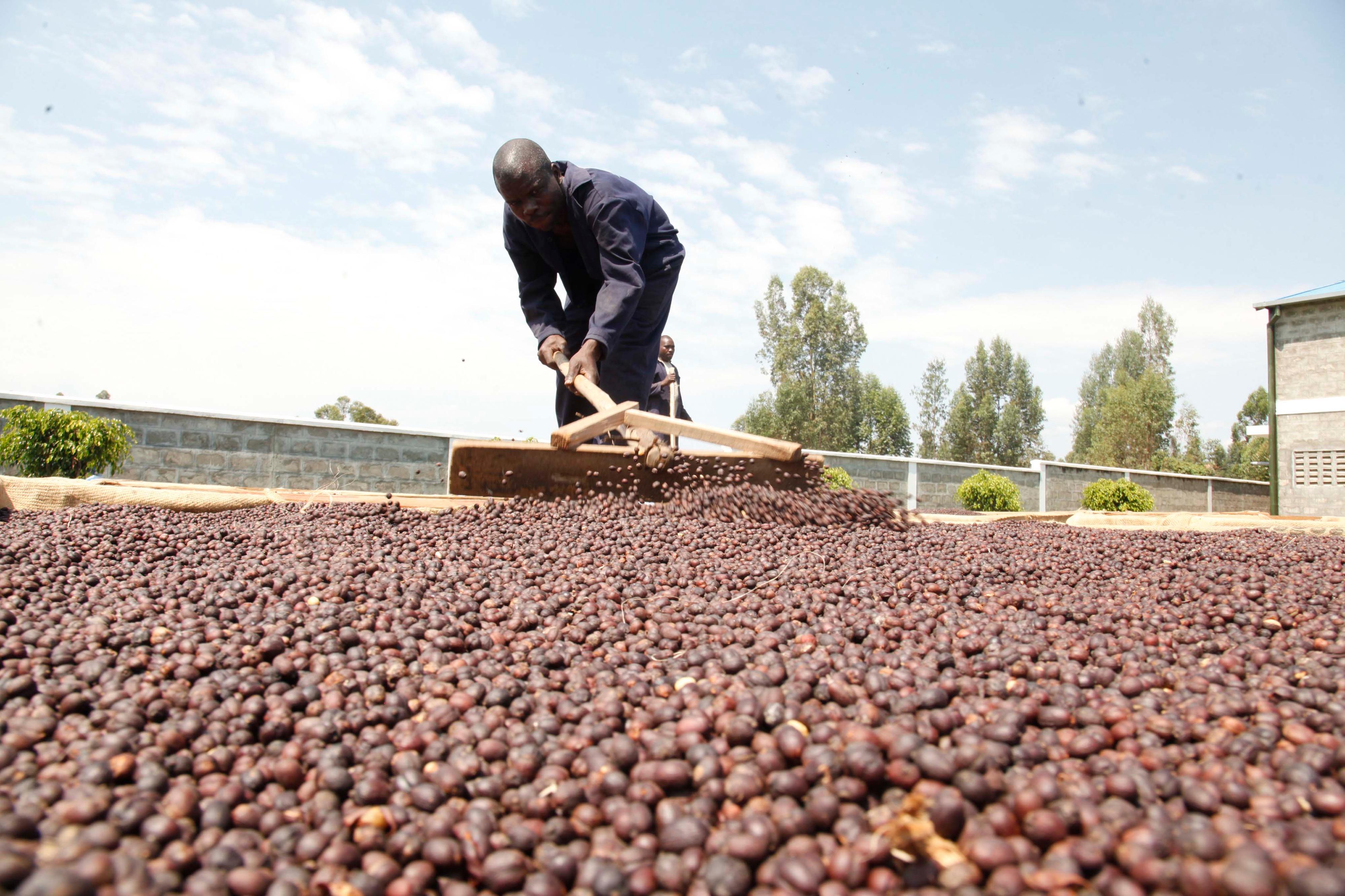Prime
From garden to cup: How Tugume is championing coffee value addition

President Museveni inspects coffee produced by Nelson Tugume at his farm in Ntugamo District. Museveni has advised farmers to add value to their coffee and earn more. Photos/Denis Bbosa
What you need to know:
- Uganda exports more than 90 percent of its coffee raw, to be value-added overseas. However a group of farmers including Nelson Tugume want to change the narrative.
- Coffee processing is a very human-intensive process. It requires a lot of expertise to make the right cup of coffee.
As the contentious agreement that was signed between the government and Vinci Coffee Company gradually disappears into thin air, Ugandan coffee farmers have been given a sigh of relief with the arrival of an all-encompassing coffee consortium.
The coffee investment consortium initiative, according to Nelson Tugume, the Director of Inspire Africa, will be the umbrella of the unions that will seek to bring together desperate coffee farmers, their differences and the competition in the market notwithstanding.
The Vinci Coffee Company-government agreement had provisions to exempt the Italian company from paying taxes for a period of 10 years which out rightly irked majority coffee traders and farmers.
“The Coffee Investment Consortium Uganda Limited got its vision two years ago to bring all coffee farmers in the value chain together to add value, get better quality and prices. It will also cater for production and production,” Tugume told Seeds of Gold.

Tugume (left) explains to President Museveni the process of value addition. Photo/Penis Bbosa
Museveni’s blessings
Like the botched Vinci Coffee of Enrica Pinetti, President Museveni is deeply involved and thrilled by the consortium only that this time he is more hands on and seemingly strict.
After commissioning the new coffee processing factory in Rwashamire-Ntungamo on December 28 last year, Museveni, accompanied by First lady Janet Museveni, stoutly warned whoever stepped in Uganda’s budding idea of adding value to coffee production.
“I will not tolerate anybody who stands in my way of adding value to Ugandan coffee. When I bring an idea as Yoweri Museveni, I know what I’m doing and I will not let anybody to divert me unless you want problems,” Museveni stressed.
Tugume who had hosted him reveals it all started with a meeting with Museveni in Munyonyo as he exhibited his coffee by-products.
“Last year in May I met president Museveni in Munyonyo at a Turkey-Uganda Business Forum and he took a lot of interest in my exhibitions. He asked me how he can support me and I proposed that he gives me $5.3m to finish the Ntungamo coffee hub. I was surprised when he visited us at Rwashimire and talked to the coffee stakeholders from 500 cooperatives in Ankole and Kigezi,” Tugume adds.
The consortium has since spread its wings to include farmers from across the country and when Tugume was invited to brief the cabinet about the initiative, he told the ministers about the virgin opportunities in the US, China and UAE.

Tugume (left) picks only red beans during harvest. Photo/Penis Bbosa
He also illustrated the formation of five nationwide coffee hubs outside Ntungamo that includes one in Kapchorwa managed by Masha, another at Namanve, Zombo handled by Kawa Mwa, Mitooma by Rubanga Cooperative, Rwenzori by the AKR, and Omukazi W’omutima in Kanungu.
According to Tugume, all these hubs, along with the main one at Ntungamo, are the first deliverables for the grand coffee value chain to be operational and that these six hubs will all be working with 100,000 farmers.
Most farmers believe the consortium will aid them to find a single brand to market their coffee from the region and country at large without being cheated by the multi-international companies and unscrupulous middlemen.
More coffee by-products
Uganda exports more than 21 million tonnes of coffee to the world market and recent stats show that the country is the top coffee exporting nation in Africa and its total production represents about five percent of the global production.
Tugume informed the President that a total of 50 cooperatives have come together under the Ankole Rwenzori Kigezi Coffee Investment Consortium Uganda (ARKC) to promote value addition and determine the price of coffee on the global market instead of being determined by people in their executive offices.
“You can’t add value to coffee if you do not have it. We have the potential to add value to coffee locally and produce coffee creams, gels, perfume, powder, roasted beans among other products. Working with global partners we can get the market for our products and also use the same platform to promote other agribusiness enterprises like fruits, vegetables, flowers, beef, dairy, and even elevating tourism,” says Tugume.
A whooping $10m (Shs3.7bn) has been invested into the project pilot start and yet Tugume is confident Uganda will reap more triple dividends if they follow the script.
Driven by the conviction that you don’t eat the seed but plant it for more yields, Tugume was inspired to open up his coffee processing factory chain when one time an Ethiopian Coffee Hub in the US sold him 250gms of Ugandan coffee at $79 (Shs292,300).
The latest market for Ugandan Coffee by-products is Serbia and the UAE which inevitably will call for more production across the country to satisfy it.
To drive the grand initiative to fruition, Tugume has joined hands with renowned entrepreneur Amos Wekesa of the Great Lakes Safari enterprise and Odrek Rwabwogo, a farmer, entrepreneur and special Adviser to the President.

Coffee beans must be put on a clean surface such as a tarpaulin after harvest.Photo/Penis Bbosa
Coffee numbers
Yet as the Coffee consortium seeks to eliminate middle men and increase the prices for the downtrodden farmers the cry by stakeholders to the government to improve the capital cannot get any louder.
To achieve the set $2.2bn coffee revenue a year by 2025, the government ought to do more than enacting the National Coffee Act of 2021 and raising coffee production from four million 60-kilogramme-bag to 20 million 60-kilogramme-bag by 2030.
Coffee roasting
Unroasted coffee is also known as green coffee and such beans have all the flavours locked in them. Roasting seeks to transform the green coffee into the aromatic brown beans you buy in your favourite stores.
Green beans are first dried until they become yellow and develop roasting smell.
Coffee grinding
The primary goal of a grind is to produce the most flavour in a cup of coffee.
The type of coffee brewer used determines how fine or coarse the coffee should be ground.
The type of grinding determines how fast the coffee can release its flavours.
This is the reason espresso coffee is so finely ground. On the other hand, coffee prepared with filter coffee makers is coarse-grained (coarsely ground).




